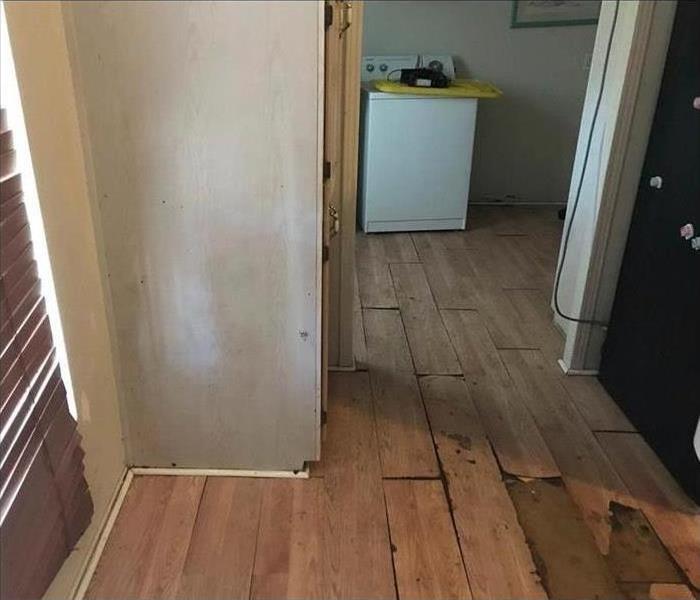How Does Water Affect Building Materials?
11/7/2022 (Permalink)
How Do Building Materials React to Water?
Water is one of the most dangerous elements to deal with in your home. It can cause damage on every level, from mold and mildew to rotting wood and even termites. Water can also be very destructive to many different building materials, such as wood, plaster, metal, and concrete. Fortunately, there are ways you can protect yourself from these issues.
Swelling Wood
If you've ever had to move a water-damaged piece of furniture and watched it crack, crumble, and fall apart as if there were some sort of zombie virus in the wood, you've experienced this phenomenon firsthand. Wood is porous and absorbs water, which can swell the fibers of the wood as well as cause small gaps between them. When this happens, the wood will shrink back to its original size when it dries out again; however, if too much moisture has been absorbed into a piece of furniture or other household item (especially from water lingering on one side), then it may be irreversibly damaged. As we all know from experience with dishes or clothing that have been soaked in the sink for too long: when you leave something wet for too long, mold growth will occur, and damage is irreversible.
Plaster and Drywall
The other two common building materials are plaster and drywall. Plaster is a very soft, malleable material that can be molded into any shape or form, then set. It's used as the finish coat in most homes and buildings to give them a smooth finish or texture. If water gets behind a wall of plaster, it can swell up quite a bit. However, if you act quickly by drying out the walls with fans and heaters attached to blowers (the same kind used for drying paint), it should be fine after some time passes — if there's no mold growth or damage from freezing temperatures while waiting for drying to occur.
Drywall is very similar to plaster except it doesn't have any give whatsoever: once you put drywall up on your walls, that's where it stays until you decide otherwise! The only way this type of material will crack apart during normal use is if there's too much moisture present within its structure.
Metal
You may have heard the expression, “Water and metal don’t mix.” While this isn’t exactly true, it does illustrate the point that metal can be damaged by water. There are three different ways that this can happen:
- Cracking of the material due to expansion and contraction caused by temperature changes.
- Corrosion, which is chemical degradation of a metal surface over time as it encounters oxygen and/or water molecules. This leads to rusting (oxidation), tarnishing (electrochemical corrosion), or pitting (galvanic corrosion).
Concrete
Concrete is a great building material, but it’s also porous and can absorb water. If your concrete isn’t cured properly or if it isn’t protected from water, it can be damaged by water.
Brick
Brick is made of clay and sand. It absorbs water, which can cause bricks to fall out of place or crack when exposed to freezing temperatures. While brick can be dried out, it takes a long time — up to several weeks depending on the size of the area affected. If your brick becomes damaged due to exposure to moisture or freezing temperatures, you may need professional help removing and replacing it.
Water can damage many common building materials, but some can be saved
Water damage is a serious problem. Water can seep into your building materials, causing them to expand or contract and crack. This can cause a host of other problems, like mold growth and rotting wood.
The cost of repairing water damage can be high, with some estimates running as high as $5 per square foot. To avoid this expensive repair bill, you'll want to act quickly when you notice signs of water intrusion in your home or on your property.
If you think that your home or business has been damaged by water, call the professionals at SERVPRO of Downtown Las Vegas. We offer free quotes for all types of restoration services in Las Vegas.
While water damage can be a major problem for building materials and structures, it's important to remember that not all buildings are the same. Different materials react differently to water, so you'll need to know how they're affected before deciding on any course of action. In some cases, it might be possible to salvage your home or business after storm damage.





 24/7 Emergency Service
24/7 Emergency Service
